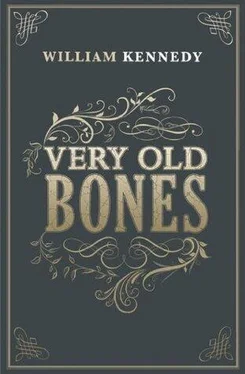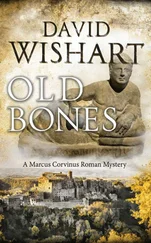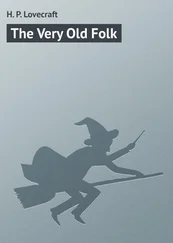Francis got up and saw that only I was looking at him. He made a silent shushing motion to me, then found his hat and coat on the hallway wall hooks, where Molly had hung them. He went through the kitchen and out the back door into the yard, and I followed him. We both looked at the dead automobile in the carriage barn, a 1923 Essex, up on blocks.
“That your car, kid?” he asked me.
“No sir. I’m not old enough to own a car.”
“Good,” he said. “No point in ownin’ that one anyway. Ain’t worth nothin’.”
Then he smiled, threw me a so-long wave, and walked out of the alley and down Colonie Street, heading toward the railroad tracks, his home away from home.
I watched him limp toward the street and knew he was going away, perhaps forever, which was precocious of me to think that, and which saddened me. He was an imposing figure of a man, even with his dirty clothes. His heavy-duty smile made you like his looks, and like him, even though he was beat up, and kind of old.
Now, reconstituting that moment twenty-four years later, I remember that my sadness at the loss of his presence was the first time I was certain that my father really was Peter, and that I really did belong in this family. I had seen something in the man’s face that resembled what I saw in my own face in the mirror: a kindred intangible, something lurking in the eyes, and in that smile, and in the tilt of the head — nothing you could say was genetic, but something you knew you wanted to acknowledge because it was valuable when you saw it, even though you couldn’t say what it was. And you didn’t want to lose it.
Francis turned at the front of the house and walked out of my sight, and so I then went and sat in the old car. As if to fill the void, a girl my own age entered the alley with a small black mongrel at her heel and came toward the carriage barn. She looked up into the car’s front window and saw me pretending to drive.
“Do you know how to make that thing go?” the girl asked.
“I’m not sure,” I said.
“Then you shouldn’t be up there. You could have an accident.”
“This car can’t move,” I said. “It’s on blocks.”
The girl looked at the blocks and said, “Oh, I see.” And then she opened the door and slid in alongside me. She was obviously a waif, her hair a stringy mess, her plaid jacket held at the throat with a safety pin, her feet in buttonless high-button shoes long out of fashion. But what overrode all things forlorn about her was her eyes: large and black beneath black brows and focused on me with an intensity that I now know was in excess of what her years should allow. This made me uneasy.
“Is that your dog?” I asked.
“He belongs to all of us.”
“All of who? Who are you? What are you doing here?”
“I was sent here,” she said.
“Who sent you?”
“My people. They want me to find something valuable and bring it back.”
“Valuable how?”
“I don’t know yet. They didn’t tell me.”
“Then how do you know where to look?”
“I don’t know where to look. I don’t know anything about this place. Would you like to help me?”
“Help you look for something you don’t know what it is or where it might be?”
“Yes.”
I was befuddled, and while I thought about how ridiculous this girl was I saw Molly come out the back door.
“Orson,” she called out, “did you see Francis?”
“Yes, ma’am,” I said, sticking my head out the car window. “He went out the alley and down the street.”
Peter came out then, shoving his arms into his coat, and, when Molly told him what I had said, he too went toward the street.
“I have to go now,” I said to the girl.
“I’ll go with you,” she said, and she left the Essex and followed me, as I was following Peter, the mongrel keeping pace behind us. When I reached the street I saw Peter already at the corner, looking in all directions, then heading toward Downtown on the run. I jogged and the girl jogged beside me.
“Are you looking for the man in the hat and the old clothes?” the girl asked.
“Yes, how did you know?”
“He didn’t go that way,” she said, pointing toward Peter. “He went straight ahead.” And she gestured toward the river.
I stopped and wondered whether the girl was lying, or knew something.
“He was limping,” she said.
“All right,” I said and I resumed jogging toward the river, wondering what I would do or say if I found Francis when Peter was not around. At least I could say Peter was looking for him, and Molly too.
We ran past an old hospital, empty now, with posters pasted haphazardly on its walls advertising the O. C. Tucker Shows, a carnival with high divers, games, rides, a fortuneteller, a freak show, dancers galore. On another wall I saw a minstrel-show poster of a man in blackface, and yet another of Fredric March in Death Takes a Holiday .
“That’s where I live,” the dark-eyed girl said.
“In that empty building?”
“No, in the carnival.”
“Where is it now, around here?”
“Down that street,” the girl said, but she did not change her direction to go toward the carnival, if it was there, which I doubted, for this wasn’t the right weather for carnivals or circuses. It was too cold for outdoor shows, and it was probably going to snow. I was not cold, because I was running. But I knew when I stopped I would feel chilled beneath my sweat.
“I think he went down there,” the girl said, and she ran ahead of me and down a dead-end street, beyond which lay the river flats at the edge of the old Lumber District. To this day I cannot give a cogent reason why I followed this girl, trusted her to lead me to a stranger she had seen only once, if that. But I felt that the child should not be resisted if I wanted to find Francis.
“How do you know he came this way?” I asked.
“I saw him,” the girl said.
“You couldn’t have seen him down here.”
“That’s what you say,” the girl said.
“I think you’re a little crazy,” I said, to which the girl did not reply.
We left the paved streets of the city and ran on a dirt path toward the railroad tracks, across fields of weeds and trash, and I saw in the distance half a dozen shacks that hoboes had built, saw people moving near them. Then I saw eight freight cars on a siding, with more people sitting by fires, cooking something.
“That’s where I live,” the girl said, and Orson saw the lettering painted on the cars: O. C. Tucker Shows.
“You live on the tracks?”
“We’re waiting for a steam engine to take us south,” the girl said. “We have to bribe the railroad men.”
I understood nothing about this girl. We ran in silence and then I saw Francis, walking on the flats with his limp. And how he had gotten this far walking at that speed was a mystery. Perhaps the girl and I had run in a roundabout circle to get here, though I doubted it.
“There he is,” I said, and I stopped running.
“You see?” the girl said.
We were uphill from Francis, fifty feet from him, on a slope covered with trees and high weeds, and I then chose to hide myself and watch Francis as he walked north along the tracks, his limp worse than when I last observed him. I felt myself in the presence of hidden meaning (was that what the dark-eyed girl was looking for?) both in my decision to hide, and in the vision that lay before me; and I shivered with the chill of comprehension that something woeful could happen that would mark me. In the presence of malevolence I understood that this is what you feel like before the woeful thing happens. I turned to the girl and saw her petting a kitten, stroking its head with her long, dirty fingernails. Her dog was nowhere to be seen. From the pocket of her jacket a naked doll with only one leg protruded.
Читать дальше












